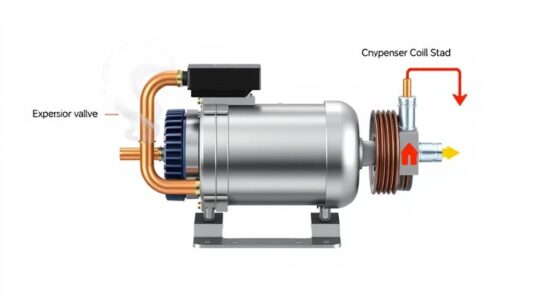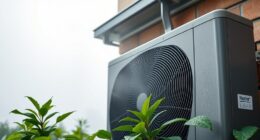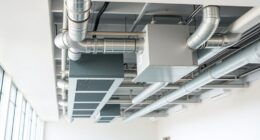Struggling with problematic issues in your heat pump refrigeration cycle? Search no more! This article is here to equip you with the understanding and methods needed to address frequent challenges that could occur in your heat pump system.
From identifying refrigerant leaks to troubleshooting low pressure, we’ve got you covered.
So, let’s dive into the world of heat pump maintenance and start serving you with effective solutions.
Key Takeaways
- Troubleshooting low refrigerant pressure is crucial and involves inspecting for leaks, checking refrigerant charge, evaluating the functionality of the expansion valve, and troubleshooting low-pressure sensors.
- Identifying and preventing refrigerant leaks can be done through visual inspection, using electronic leak detectors, and adding UV dye. Common causes of refrigerant leaks include corrosion in refrigerant lines, poor installation, and wear and tear.
- Regular inspection and maintenance are necessary to detect and address refrigerant leaks. This includes preventing corrosion, optimizing refrigerant flow, and ensuring adequate airflow throughout the system.
- Low refrigerant pressure can negatively impact heat pump efficiency and performance, leading to reduced heating or cooling capacity, longer running times, higher energy consumption, and increased risk of component failure. Troubleshooting steps for low refrigerant pressure include visual inspection, checking refrigerant levels, performing a leak test, repairing leaks, and recharging the system with appropriate refrigerant.
Understanding the Basic Refrigeration Cycle in Heat Pumps
As we delve into the topic of understanding the basic refrigeration cycle in heat pumps, it’s important to grasp the fundamental principles that govern this process. Heat pump efficiency is a key factor in ensuring optimal performance and energy savings. Regular heat pump maintenance is essential to maintain efficiency and prevent potential issues.

To understand the refrigeration cycle, we must first understand the components involved: the compressor, condenser, expansion valve, and evaporator. The cycle starts with the compressor, which raises the pressure and temperature of the refrigerant. The refrigerant then flows to the condenser, where it releases heat to the surrounding environment.
Next, the expansion valve lowers the pressure, causing the refrigerant to cool down as it enters the evaporator. In the evaporator, heat is absorbed from the surrounding air, cooling it down. Finally, the refrigerant returns to the compressor to restart the cycle. Understanding this process is crucial for heat pump efficiency and maintenance.
Now, let’s move on to identifying common refrigerant leaks in heat pump systems.
Identifying Common Refrigerant Leaks in Heat Pump Systems
When it comes to identifying common refrigerant leaks in heat pump systems, there are several key points to consider.

First, understanding leak detection methods is crucial in order to effectively locate and address the issue.
Second, it’s important to be aware of the common causes of refrigerant leaks, such as corrosion, vibration, and faulty connections.
Leak Detection Methods
We use various leak detection methods to identify common refrigerant leaks in heat pump systems. The goal of refrigerant leak detection is to identify and repair any leaks as quickly as possible to minimize the loss of refrigerant, prevent system inefficiency, and reduce environmental impact.
Some common leak detection methods include visual inspection, using electronic leak detectors, and using ultraviolet (UV) dye. Visual inspection involves checking for any visible signs of leaks such as oil stains, frost or ice buildup, or corroded fittings. Electronic leak detectors utilize sensors to detect the presence of refrigerant gases in the air. UV dye is added to the refrigerant system, and a UV light is used to identify any leaks by illuminating the dye.

These leak detection methods help us pinpoint the location of leaks, allowing us to take appropriate action to prevent further damage or system failure.
Moving on to the next section, let’s explore the causes of refrigerant leaks.
Causes of Refrigerant Leaks
Our goal is to identify the causes of refrigerant leaks in heat pump systems. Refrigerant leaks can occur due to various reasons, and it’s important to understand these causes in order to effectively prevent and repair them.
Here are four common causes of refrigerant leaks:

-
Corrosion: Over time, the refrigerant lines can corrode, leading to small holes or cracks through which the refrigerant can escape.
-
Poor installation: Improper installation of the heat pump system can result in loose connections or damaged components, causing refrigerant leaks.
-
Wear and tear: Normal wear and tear on the system, including vibrations and movement, can lead to weakened joints and fittings, allowing refrigerant to leak.
-
Low-pressure troubleshooting: When troubleshooting low pressure in a heat pump system, it’s essential to check for any refrigerant leaks as they can cause a decrease in pressure.
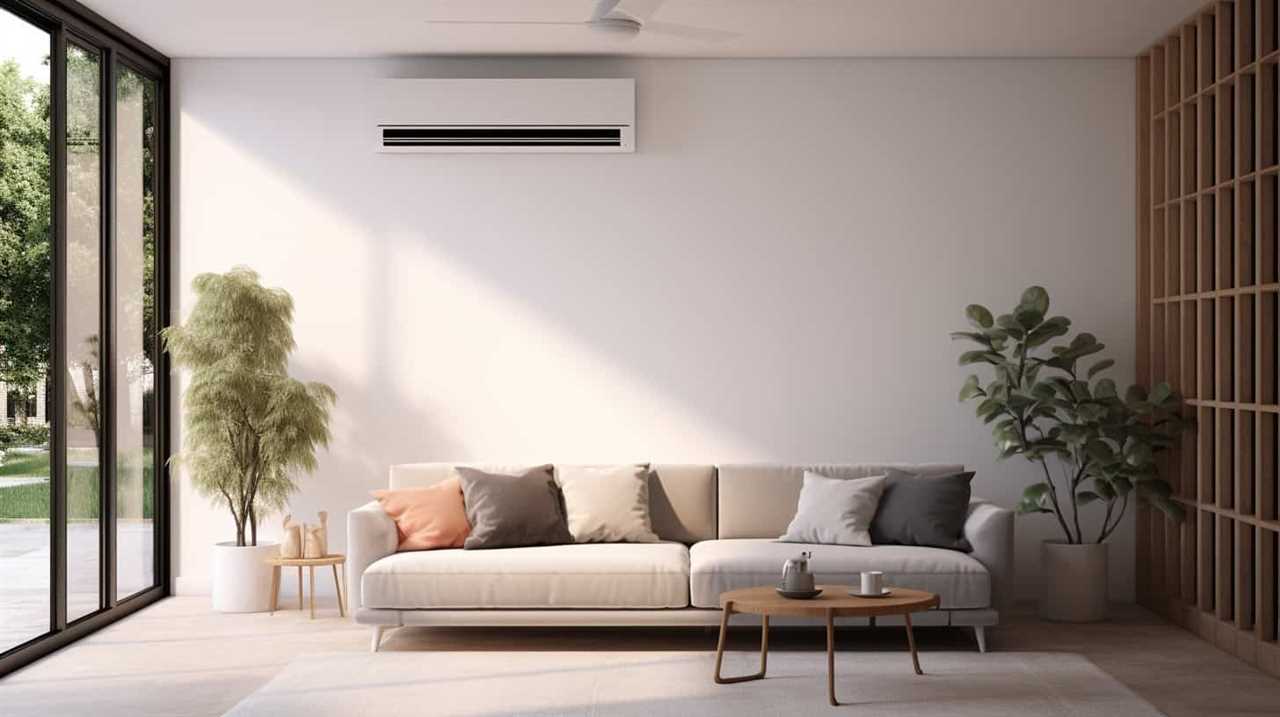
It is crucial to regularly inspect and maintain the heat pump system to detect and address refrigerant leaks promptly. By doing so, you can ensure the system operates efficiently and prevent potential damage.
Prevention and Repair
To effectively prevent and repair refrigerant leaks in heat pump systems, it’s important to identify common sources of leaks.
One common source is corrosion within the system. Corrosion can occur due to exposure to moisture or chemicals, leading to small holes or cracks in the refrigerant lines. Regular inspection and maintenance can help prevent corrosion by identifying and addressing any signs of rust or deterioration.
Another common cause of leaks is suboptimal refrigerant flow. This can result from issues such as improper charging, clogged filters, or restricted airflow. To optimize refrigerant flow and prevent leaks, it’s essential to ensure proper installation, regular filter cleaning or replacement, and adequate airflow throughout the system.
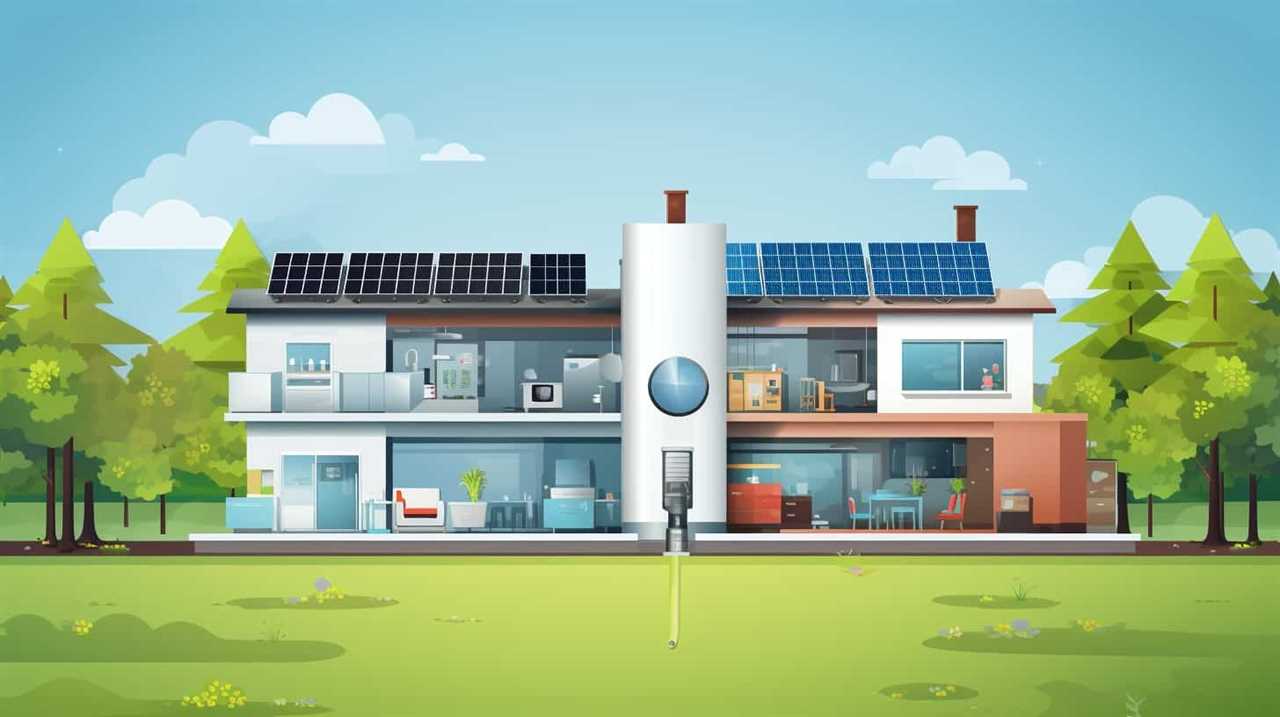
Troubleshooting Low Refrigerant Pressure in Heat Pumps
When troubleshooting low refrigerant pressure in heat pumps, it’s important to understand the causes, the impact on the heat pump, and the steps to resolve the issue.
Low refrigerant pressure can be caused by leaks, improper charging, or a faulty expansion valve.
This can result in reduced cooling or heating capacity and decreased efficiency.
To troubleshoot, one should inspect for leaks, check the refrigerant charge, and evaluate the expansion valve functionality.

Causes of Low Pressure
One common cause of low pressure in heat pumps is a refrigerant leak. When a refrigerant leak occurs, the amount of refrigerant in the system decreases, leading to inadequate cooling. Troubleshooting low pressure sensors can help identify the cause of the low pressure.
Here are four possible causes of low pressure in heat pumps:
-
Refrigerant leak: A leak in the refrigerant lines can result in a loss of refrigerant, causing low pressure in the system.
-
Faulty expansion valve: If the expansion valve isn’t functioning properly, it may restrict the flow of refrigerant, leading to low pressure.
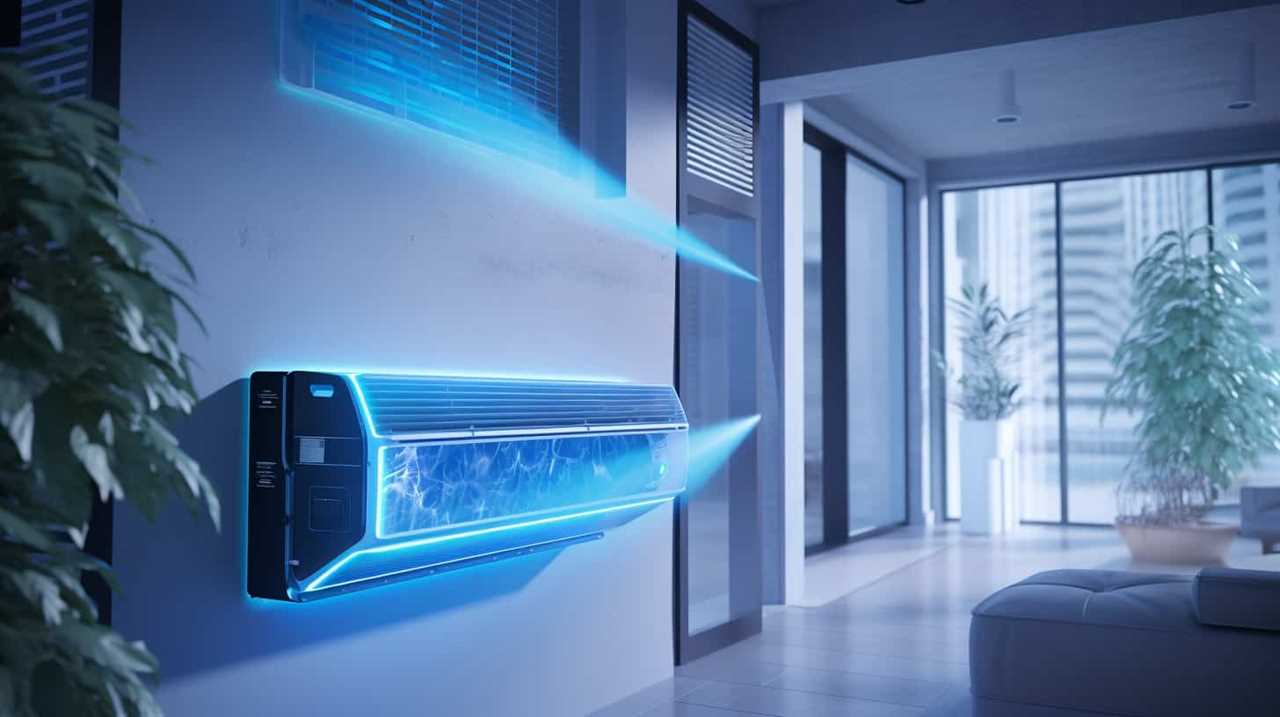
-
Blocked or restricted refrigerant lines: Obstructions in the refrigerant lines can impede the flow of refrigerant, causing low pressure in the system.
-
Faulty compressor: A malfunctioning compressor may not be able to maintain the required pressure levels, resulting in low pressure in the heat pump system.
Understanding these causes can help technicians diagnose and address low pressure issues efficiently.
Now, let’s explore the impact of low pressure on the heat pump.

Impact on Heat Pump
We can troubleshoot low refrigerant pressure in heat pumps to determine its impact on the functioning of the heat pump. Low refrigerant pressure can have a significant effect on heat pump efficiency and performance.
When the refrigerant pressure is low, the heat pump may struggle to transfer heat effectively, resulting in reduced heating or cooling capacity. This can lead to longer running times and higher energy consumption, ultimately reducing the overall efficiency of the heat pump.
In addition, low refrigerant pressure can cause the heat pump to operate at higher temperatures, increasing the risk of component failure and potentially leading to costly repairs.
Therefore, it’s crucial to address low refrigerant pressure promptly to maintain optimal heat pump performance and efficiency. To troubleshoot this issue, we can follow specific steps to identify and resolve the root cause of the problem.
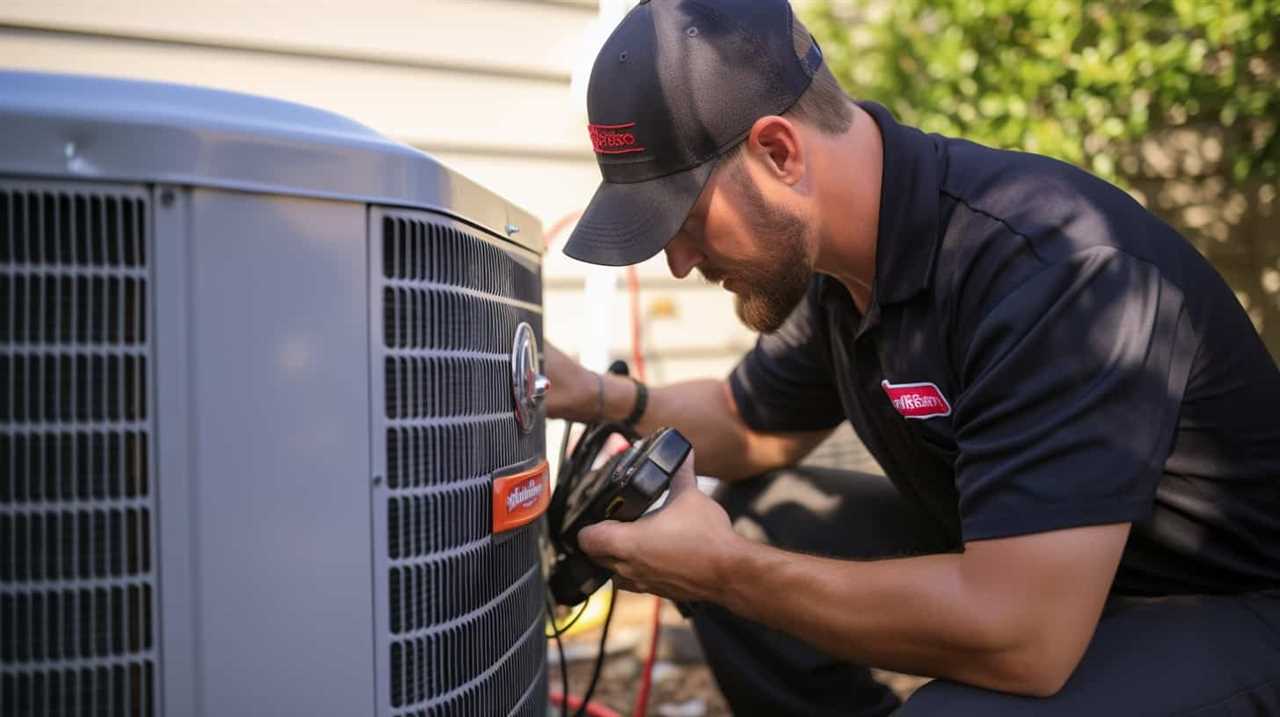
Troubleshooting Steps
By checking for potential leaks and measuring refrigerant levels, we can effectively troubleshoot low refrigerant pressure in heat pumps. Here are some troubleshooting techniques for diagnosing system malfunctions:
-
Conduct a visual inspection: Inspect the heat pump for any signs of refrigerant leaks, such as oil stains or frost accumulation. These can indicate a potential leak that may be causing low refrigerant pressure.
-
Check the refrigerant levels: Use a pressure gauge to measure the refrigerant pressure in the heat pump. If the pressure is below the recommended level, it indicates a low refrigerant charge.
-
Perform a leak test: Use a refrigerant leak detector to identify any leaks in the system. This will help pinpoint the source of the low refrigerant pressure.
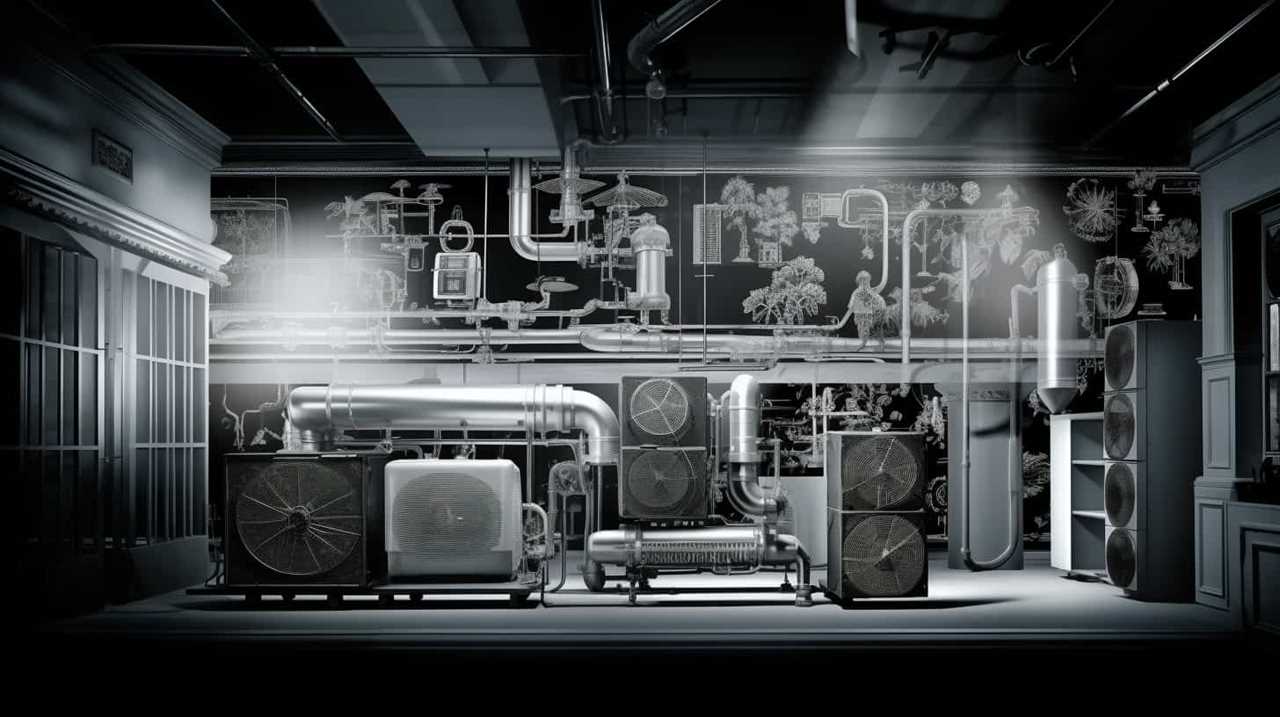
-
Repair the leaks and recharge the system: Once the leaks are identified, they should be repaired promptly. Afterward, the system can be recharged with the appropriate amount of refrigerant to restore the proper pressure.
By following these troubleshooting steps, we can diagnose and resolve low refrigerant pressure issues in heat pumps. This will ensure optimal performance and efficiency of the system.
In the next section, we’ll discuss resolving issues with heat pump compressors in the refrigeration cycle.
Resolving Issues With Heat Pump Compressors in the Refrigeration Cycle
When troubleshooting heat pump compressors in the refrigeration cycle, it is important to identify and address any issues promptly to ensure optimal performance. Compressor maintenance plays a crucial role in the smooth functioning of the heat pump system. Common issues with heat pump compressors include electrical problems, refrigerant leaks, and mechanical failures. By conducting regular inspections and performing routine maintenance, these problems can be minimized. It is essential to check the electrical connections, clean the condenser coils, and ensure proper lubrication of the compressor. Additionally, troubleshooting the refrigeration cycle involves checking for any refrigerant leaks, adjusting the refrigerant charge, and inspecting the expansion valve. By addressing these issues promptly and following proper maintenance procedures, we can ensure the longevity and efficiency of the heat pump compressor.
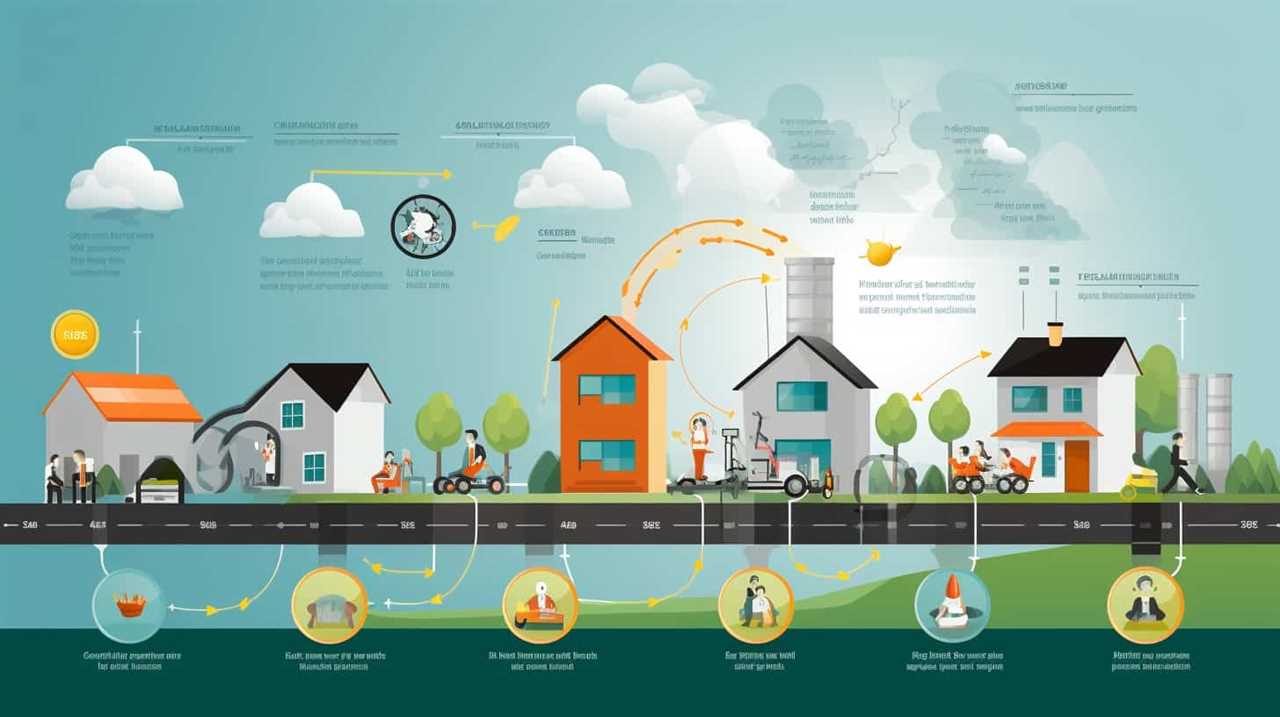
| Common Compressor Issues | Causes | Solutions |
|---|---|---|
| Electrical problems | Loose connections or faulty wiring | Check and tighten electrical connections |
| Refrigerant leaks | Aging or damaged components | Repair or replace damaged components |
| Mechanical failures | Wear and tear or lack of lubrication | Lubricate the compressor and replace worn-out parts |
Note: Proper training and expertise are essential when performing compressor maintenance and troubleshooting.
Fixing Refrigeration Cycle Obstructions and Blockages in Heat Pumps
To address refrigeration cycle obstructions and blockages in heat pumps, we must identify and remove any barriers that impede the flow of refrigerant. By conducting regular refrigeration cycle maintenance, we can ensure optimal heat pump performance and prevent any potential issues.
Here are four key steps to fix refrigeration cycle obstructions and blockages:
-
Inspect the refrigerant lines for any physical obstructions such as debris or ice buildup. Clear any blockages to allow smooth refrigerant flow.
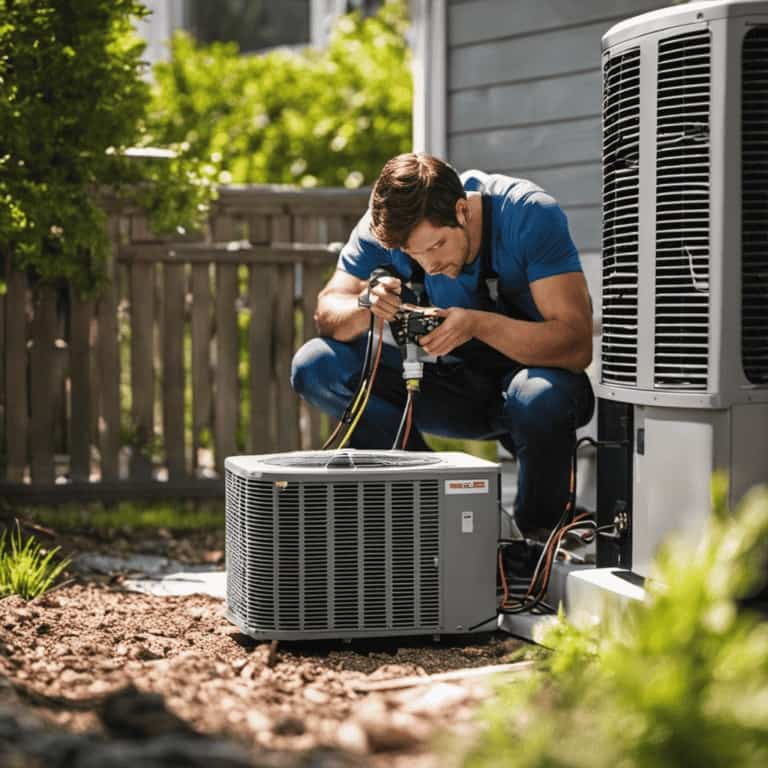
-
Check the expansion valve for any clogs or restrictions. Clean or replace the valve if necessary to ensure proper refrigerant expansion.
-
Verify that the filter drier is clean and functioning correctly. Replace it if it’s clogged or damaged to prevent any refrigerant flow restrictions.
-
Examine the evaporator coil for dirt or debris accumulation. Clean the coil to improve heat transfer and maintain efficient refrigerant flow.
Preventing and Addressing Refrigerant Contamination in Heat Pump Systems
How can we prevent and address refrigerant contamination in heat pump systems?

Proper refrigerant management and heat pump maintenance are essential in preventing and addressing refrigerant contamination. Regular inspections and maintenance of heat pump systems can help identify any leaks or potential sources of contamination. It’s important to ensure that all connections and fittings are tight and secure to prevent refrigerant leaks.
Additionally, regular refrigerant testing and analysis can help detect any contaminants present in the system. If contamination is found, it’s crucial to promptly address the issue by removing the contaminated refrigerant, thoroughly cleaning the system, and replacing the refrigerant with a clean and appropriate type.
Proper training and education for technicians on refrigerant management practices can also aid in preventing and addressing refrigerant contamination in heat pump systems.
Frequently Asked Questions
How Often Should I Have My Heat Pump Refrigerant Levels Checked and Serviced?
We regularly check and service heat pump refrigerant levels to ensure optimal performance. It’s important because different heat pump refrigerant types require specific levels for efficient operation. Regular maintenance helps prevent issues and extends the lifespan of your heat pump.

What Are the Signs of a Refrigerant Leak in a Heat Pump System?
When it comes to common heat pump refrigeration cycle issues, it’s important to know the signs of a refrigerant leak. By following troubleshooting steps, we can identify and address the problem efficiently.
Can Low Refrigerant Pressure in a Heat Pump Cause Damage to Other Components?
Yes, low refrigerant pressure in a heat pump can cause damage to other components. It can lead to inefficient operation and reduced cooling or heating capacity, impacting overall system efficiency and performance.
Are There Any Specific Maintenance Tasks I Can Perform to Prevent Issues With the Heat Pump Compressor?
Preventive maintenance is crucial for avoiding issues with the heat pump compressor. Regularly cleaning the coils, checking refrigerant levels, and ensuring proper airflow can help troubleshoot any potential compressor problems.
How Can I Prevent Refrigerant Contamination in My Heat Pump System?
To prevent refrigerant contamination in our heat pump system, we can implement regular maintenance tasks such as checking for leaks, ensuring proper refrigerant levels, and cleaning or replacing filters. This optimizes the efficiency of our heat pump system.
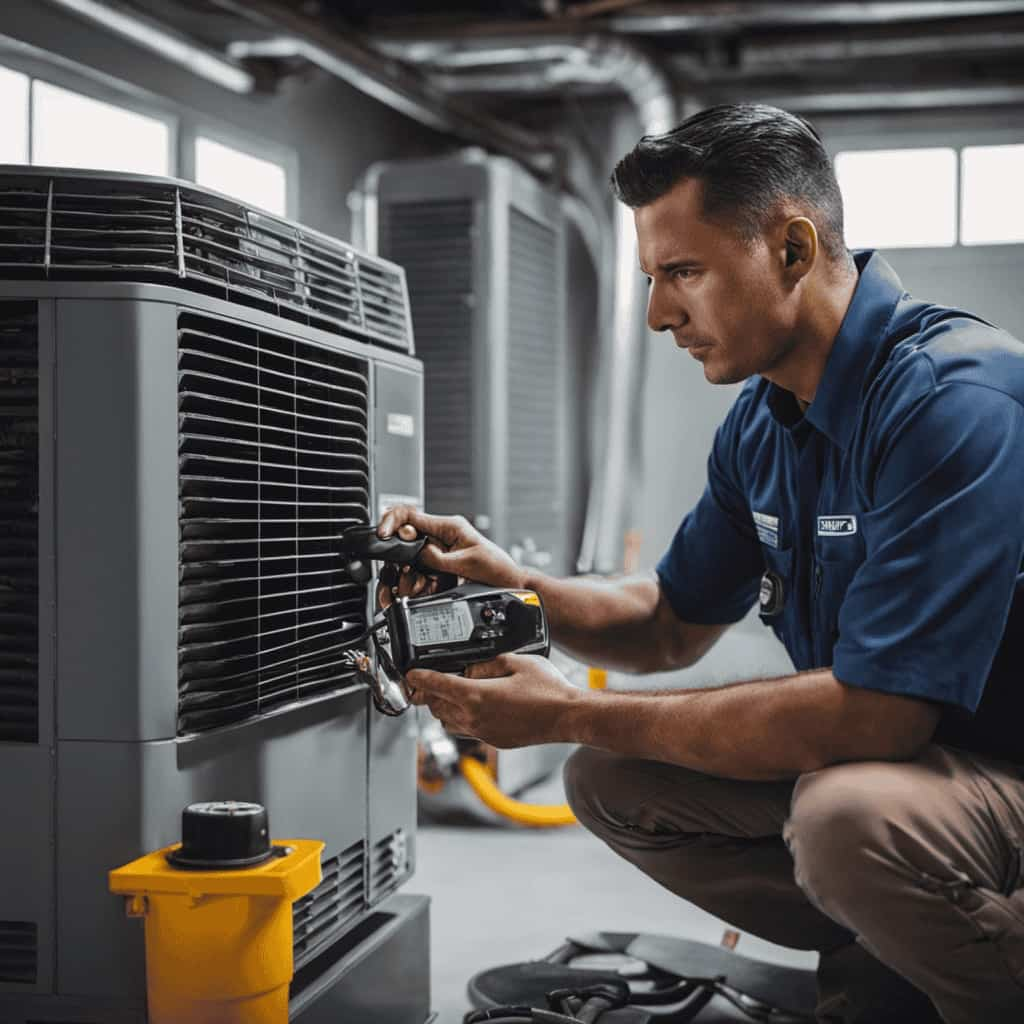
Conclusion
In conclusion, understanding and troubleshooting common refrigeration cycle issues in heat pump systems is crucial for optimal performance.
Just like a well-oiled machine, a heat pump relies on a smooth and efficient refrigeration cycle to provide reliable heating and cooling.
By addressing refrigerant leaks, low pressure, compressor problems, obstructions, and contamination, we can ensure that our heat pumps continue to function effectively, keeping our spaces comfortable and energy-efficient.
Remember, a well-maintained refrigeration cycle is the key to a well-functioning heat pump.




